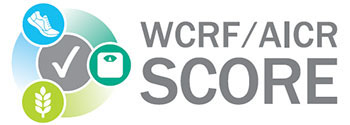
What Is the 2018 WCRF/AICR Score?
The 2018 WCRF/AICR Score is a standardized scoring system that can be used by researchers to assess adherence to the 2018 World Cancer Research Fund (WCRF)/ American Institute for Cancer Research (AICR) Cancer Prevention Recommendations and examine associations with cancer-related and other health outcomes.
Who Developed the Score?
Researchers at the National Cancer Institute (NCI) formed a collaborative team to address the challenge of creating a standardized scoring system that could be operationalized globally. The team included researchers from the AICR, WCRF International, and Barcelona Institute for Global Health (ISGlobal), in consultation with the WCRF/AICR Continuous Update Project (CUP) Expert Panel and additional international researchers.
Why Was the Score Developed?
In 2018, the WCRF and AICR published Diet, Nutrition, Physical Activity and Cancer: a Global Perspective![]() , the WCRF/AICR Third Expert Report. This report underpinned the updated ten Cancer Prevention Recommendations
, the WCRF/AICR Third Expert Report. This report underpinned the updated ten Cancer Prevention Recommendations![]() (also listed in the table below) that set the benchmark for evidence-based lifestyle guidance, including eating a healthy diet, maintaining a healthy body weight, and engaging in regular physical activity, as well as targeted recommendations for breastfeeding women and cancer survivors. The WCRF/AICR CUP Expert Panel, who authored the recommendations, highlighted that each recommendation was intended to be one part of a comprehensive package of modifiable lifestyle behaviors that, when taken together, promote a healthy pattern of diet and physical activity conducive to the prevention of cancer, other non-communicable diseases, and obesity.
(also listed in the table below) that set the benchmark for evidence-based lifestyle guidance, including eating a healthy diet, maintaining a healthy body weight, and engaging in regular physical activity, as well as targeted recommendations for breastfeeding women and cancer survivors. The WCRF/AICR CUP Expert Panel, who authored the recommendations, highlighted that each recommendation was intended to be one part of a comprehensive package of modifiable lifestyle behaviors that, when taken together, promote a healthy pattern of diet and physical activity conducive to the prevention of cancer, other non-communicable diseases, and obesity.
The first formalized WCRF/AICR Cancer Prevention Recommendations were published in Food, Nutrition, Physical Activity, and the Prevention of Cancer: a Global Perspective, the Second Expert Report (2007). Many past studies derived scores from the 2007 Cancer Prevention Recommendations, to investigate associations between adherence and cancer risk and health outcomes, but no standard scoring approach was ever developed or proposed for these Recommendations. The ad hoc creation of scoring approaches for the 2007 Recommendations has limited the direct comparability of study results. The release of the Third Expert Report prompted the NCI-led team to propose the collaborative development of a standardized scoring system for use in research.
The 2018 WCRF/AICR Cancer Prevention Recommendations1
| Recommendations | Details | Goals |
|---|---|---|
| 1. Be a healthy weight2 | Keep your weight within the healthy range and avoid weight gain in adult life |
|
| 2. Be physically active2 | Be physically active as part of everyday life—walk more and sit less |
|
| 3. Eat a diet rich in whole grains, vegetables, fruits, and beans2 | Make whole grains, vegetables, fruits, and pulses (legumes) such as beans and lentils a major part of your usual daily diet |
|
| 4. Limit consumption of “fast foods” and other processed foods high in fat, starches, or sugars2 | Limiting these foods helps control calorie intake and maintain a healthy weight | Limit consumption of processed foods high in fat, starches, or sugars—including fast foods; many prepared dishes, snacks, bakery foods and desserts; and confectionery (candy)2 |
| 5. Limit consumption of red and processed meat2 | Eat no more than moderate amounts of red meat, such as beef, pork, and lamb. Eat little, if any, processed meat. | If you eat red meat, limit consumption to no more than about three portions per week. Three portions are equivalent to about 350 to 500 g (about 12 to 18 oz) cooked weight of red meat. Consume very little, if any, processed meat.2 |
| 6. Limit consumption of sugar-sweetened drinks2 | Drink mostly water and unsweetened drinks | Do not consume sugar-sweetened drinks2 |
| 7. Limit alcohol consumption2 | For cancer prevention, it’s best not to drink alcohol | For cancer prevention, it’s best not to drink alcohol2 |
| 8. Do not use supplements for cancer prevention | Aim to meet nutritional needs through diet alone | High-dose dietary supplements are not recommended for cancer prevention—aim to meet nutritional needs through diet alone |
| 9. For mothers: breastfeed your baby, if you can2 | Breastfeeding is good for both mother and baby | This recommendation aligns with the advice of the WHO, which recommends infants are exclusively breastfed for 6 months, and then up to 2 years of age or beyond alongside appropriate complementary foods2 |
| 10. After a cancer diagnosis: follow our Recommendations, if you can | Check with your health professional about what is right for you |
|
1AICR, American Institute for Cancer Research; BMI, body mass index; WCRF, World Cancer Research Fund; WHO, World Health Organization.
2This recommendation or goal is operationalized in the 2018 WCRF/AICR Score.